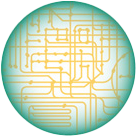Measuring Microbial Phenotypes for Improving Genome-Based Predictions
Authors:
Dale A. Pelletier1* ([email protected]), Amber N. Bible1, Leah H. Burdick1, Elisha Wood-Charlson2, Paramvir S. Dehal2, Janaka N. Edirisinghe3, Jennifer Morrell-Falvey1, Andrew P. Freiburger3, Christopher S. Henry3, Dileep Kishore1, Jennifer Kuehl2, Hira Lesea2, Christopher Neely2, Trent R. Northen2, Markus de Raad2, Priya Ranjan1, Adam P. Arkin2, Mitchel J. Doktycz1 (PI)
Institutions:
1Oak Ridge National Laboratory; 2Lawrence Berkeley National Laboratory; 3Argonne National Laboratory
Abstract
Microbes perform numerous essential roles in terrestrial ecosystems including biogeochemical cycling of nutrients, soil structuring, and plant productivity. Despite the tremendous gains in knowledge of the metabolism of microbes, predicting microbial phenotypes from genomic information across the vast diversity of microbes remains a challenge. This presentation will discuss ongoing collaborative efforts between the Plant-Microbe Interfaces and the Ecosystems and Networks Integrated with Genes and Molecular Assemblies Science Focus Areas (SFAs), to establish a cross-SFA characterized strain collection with measured microbial phenotypes for improving genome-based predictions. These collections represent isolates of plant microbiomes and subsurface microbiomes, respectively.
Standardized methodologies and phenotyping datasets are being developed for expanding this dataset and for serving as a data standard for genotype- to-phenotype prediction tools and methodologies within Systems Biology Knowledgebase. This dataset and related tools lay the groundwork for broader community engagement and will be useful for developing more robust phenotype prediction classifiers that cover a broader array of carbon sources and a phylogenetically diverse set of microbes. With this integration and standardized approaches, the research team strives to enable users to predict microbial phenotypes from a wide array of genomes, thereby significantly advancing microbial research.
